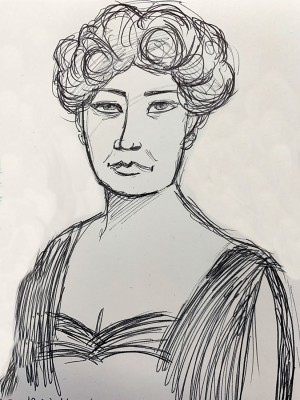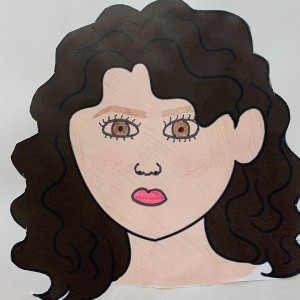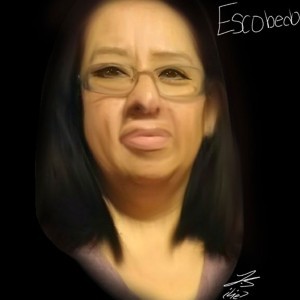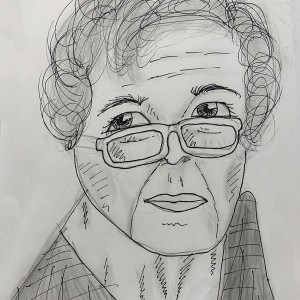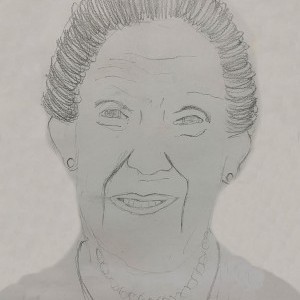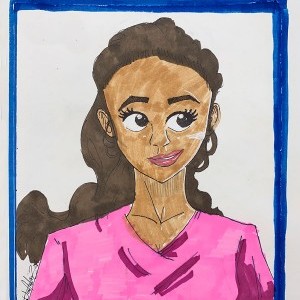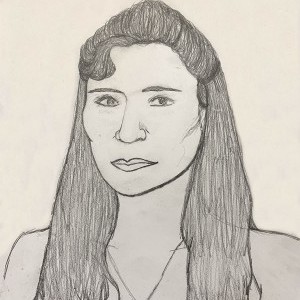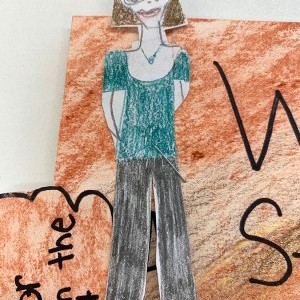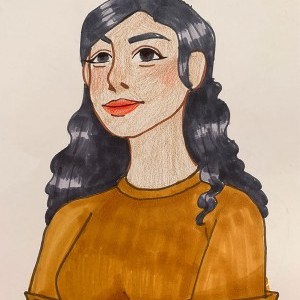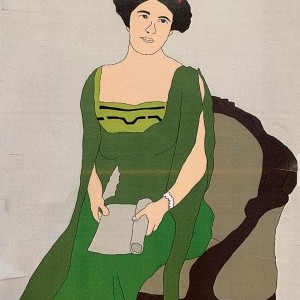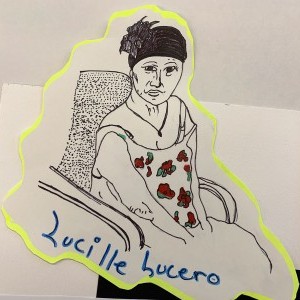Lana Vigil
Kunsmiller Creative Arts Academy | Denver, CO | 11th Grade
Inspirational Family Member
My Interview with Grammy
Lana: What was the world like politically/culturally when you were old enough to vote?
Grammy: Ya know, to be honest I don't even remember, when I was old enough it was…ugh God, it was so many years ago… Well it was after Kennedy… Johnson…I guess Johnson was… well maybe… it wasn't as bad as it is today. But there was so much more hush-hush, I mean the men could sleep with a woman and get by with it because nobody said anything, you know it was all boys will be boys.
Lana: Why do you think it was like that?
Grammy: Because women had yet to start speaking out, I mean you know, it was still…rape was still considered like the woman’s fault because the way she dressed and the places she hung out at, which we know is false. Rape is nothing about the way you dress, its just about the rage in the men, but back then it was the same thing you know, politically wise men could do whatever they wanted and get by with it. I mean we had Russia to contend with, you had Khrushchev that took off his shoe and pounded on a table, I mean you know he just reminds me a lot of Trump.
Lana: Does he?
Grammy: Yeah, temper tantrum wise, “If I don't get my way I'm gonna be a bad boy!” You know?
Both Laughing
Grammy: And Trump’s used to being television monitored, versus back then it was who you knew and who could benefit and that's the world Tump’s trying to live in now and it don't work.
Lana: Was anyone in our family, ever denied the right to vote?
Grammy: No. Well no yeah wait I take that back, I have a cousin. [Laughing]
Lana: What happened?
Grammy: Uhhh well, when you murder three or four more people..[Laughing] Ya kinda get taken away your rights.
Lana: Huuuh that makes sense. [Jokingly]
Grammy: [Laughing] I mean ya know, other than that, no.
Lana: Um... talk about the importance of voting.
Grammy: More and more I'm beginning to wonder, cause every year I vote and every year the opposite person wins. But, if you don't vote then I don't think you should have the right to say you don't like what’s going on. I mean that's my number one peeve. The people that bitch the most have not gone out and voted. I mean really the importance is that you can have a creep and if he had a lot of friends he could, he could be elected to office. Because people just go “oh well, it's not my problem, I’m not gonna vote.” but then you pay for what you get.
Lana: [Trying to remember question] When you’re like voting and stuff is it different from back then, or like how would you describe it.
Grammy: Voting then vs now?
Lana: Yeah!
Grammy: Back then I think we could trust the politicians a little more than we can today. I'm sorry but so many of them speak out of both ends. I mean you know, ‘well i'm talking to these people, I'm gonna say this. I'm talkin to those people i'm gonna say that’. And then they get in trouble when they get caught.
Lana: Did you hear about Trump talking to other countries? [Off topic?]
Grammy: He's talked to so many people that he has no business talking to, he's used to being a television star and in television you can get by with anything, and he just hasn't… that man has...you know at times I think he's illiterate.[Laughing] I really do! Have you ever tried to watch him read something?
Lana: Yes!
Grammy: It's like duhhh what’s that word?
Lana: Did you hear him talking about building a border around Colorado, forgetting about New Mexico? [Still Off topic?]
Grammy: Ya, he, I think to be honest early dementia is setting in, [Laughing] Really! He's old enough and when dementia sets in you tend to forget this and that, and I think that’s what’s happened to him, I really believe, cause he wasn’t always so stupid. It's only been in the last 3-4 years he's been starting to get this way.
Lana: Do you like voting? Is it something you do every year?
Grammy: I like voting, I mean you know especially for property tax increases and Tabor (Tax Payer’s Bill of Rights) Law and you know stuff that affects the people. I really enjoy that Who runs it? Not so much.
Lana: [Searching for the next question] Were you the first woman to vote on your side of the family? Or were there people before you?
Grammy: I'm sure there were others before me.
Lana : Any woman before you?
Grammy: Oh yeah.
Lana: Like who? Sorry family-wise I mean.
Grammy: Well I know my dad voted.
Lana: Did your Grandma? Or your Mom?
Grammy: Well I never knew my grandparents, I didn't know my mom so I can't say. I mean I met her like two times before she died, so I don't have a lot of information on her. My sisters all voted, and all my half-brothers, my one brother, Uncle Chuck, he was in the military for 20 years and that's one thing he really believed in, voting.
Lana: Do you really believe in voting? Is it something very essential to you?
Grammy: I think so because I wanna be able to open my mouth and say hey I voted, and I don't like this. I didn't vote for it, but I feel if I didn't vote I wouldn't feel like I have the right to say you know anything good or bad.
Lana: Were you excited to vote for the first time?
Grammy: No it was just something that, you know, I finally got old enough to do. It's like turning 21, you can't do anything until you turn 21, so I turned 21 and I could do it. So I went and did it! I think there were only a couple times I didn't vote, and that was one year, before Tanya was born, we lived in Bailey and we had to go to…far away and there was a ground blizzard, South Park, so I couldn't make it.
Lana: That's a good reason.
Grammy: Well I mean if we couldn't get there.[Laughing] But that's the only time I could remember I couldn't go vote. All the other times I went and voted. I really like the absentee ballot where they send it home and we could look at it, I would go oh and be able to look up and research how I want to vote, I'm for absentee more now than ever.
Lana: Well, that's everything. Thank you grandma.
Grammy: You’re welcome!
Historical Figure I Admire
Inez Milholland Boissevain
"I am prepared to sacrifice every so-called privilege I possess in order to have a few rights.” This quote from Inez Millholland, during one of the many suffrage movements she attended, speaks clearly of how women of economic advantage used their status to work for the rights of all women. Inez Millholland was born and raised in Brooklyn, New York. She was born into a wealthy family and was the eldest daughter of three siblings. Her father was a reporter and writer who supported political reforms centered on world peace, civil liberties, and women’s suffrage. This led to Ms. Millholland becoming an influential suffragist and a public speaker that contributed to the women's movement. Finally, she was a key leader figure during the 1913 women's suffrage procession.
During the beginning of World War I, Ms. Millholland began to write for the New York Tribune. To have the best accounts for her writing, she wanted to be able to visit the front lines in the war to write anti-war articles. This led to her censure by the Italian government, which ousted her from the country. Going back to her censure she later felt she had been barred from the frontlines, not because she was a pacifist, but because she was a woman. In 1916 she had gone on tour, west, to speak for women's rights despite her failing health where she publically inquired, "Mr. President, how long must women wait for liberty?"
Ms. Millholland continued to be influential even after her death. When she died, her sister decided to devote her time, as well, to suffrage work and equal rights for women. One might wonder what led her to become an impassioned suffragist and a public speaker. It began at a young age when her mother exposed her children to cultural and intellectual activities. She also had a lot of experiences along with being a member of the NAACP, the WTUL, the Equality League of Self Supporting Women in New York, the National Child Labor Committee, and England's Fabian Society. With Inez Milholland participating in so many organizations and speaking events, it encouraged people to show up and listen due to her rising fame. She was aware that she was a role model and acted accordingly, she was one of the members of suffrage movements people came to see speak. She practically sacrificed her life, she was ill and her health was only decreasing when she spoke at an event in 1916, she fainted during her speech and later died in the hospital. She is still contributing today through her legacies, one of which is the Inez Milholland Professorship of Civil Liberties at New York University School of Law.
What the Project Means to Me
Voting to me matters a lot because it is your right to speak out for what you want to decide and how things should be in your head. I believe a great amount of what my Grandma said and really liked talking to her because it's not something we do often, I was able to learn about her and her side of the family. For instance, I never knew she has siblings and her mother was never really in her life. My grandma is also super honest and doesn't care what people think about her opinions because she is that type of woman, she took really well to the interview as well and I hope we can keep in touch more often. I wish I could have had my questions more ready and prepared for the time cause at some parts of the interview I got off topic and my questions sounded very un-academic. I will not be able to vote until I graduate from school because of the year I was born so I have no voting experience, but my grandma votes every year and it’s inspiring to know that it is worth it and that people in my family are using those privileges.
Reflecting on something my grandma has said, “Anymore I'm beginning to wonder cause every year I vote and every year the opposite person wins. But, if you don't vote then I don't think you should have the right to say you don't like what’s going on. I mean that's my number one peeve. The people that bitch the most have not gone out and voted. I mean really the importance is that you can have a creep and if he has a lot of friends he could, he could be elected to office. Because people just go “oh well, it's not my problem, I’m not gonna vote.” but then you pay for what you get.“ I agree with what she is expressing and hope the future of voting will have more participation.
Explore the Archive
More From This Class
Click on the thumbnails below to view each student's work.Deadline Extended
There's still time to join Women Leading the Way.
Become a part of our storytelling archive. Enroll your class today.
Join the Project


